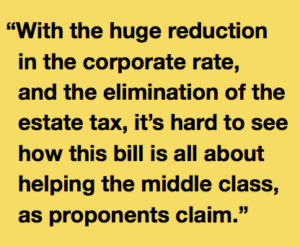While my last report covered this same subject, most of the detail of the Republican tax plan had not yet come to light. Since that time, both the House and the Senate passed the legislation and will now be working to reconcile the differences between the two tax plans. As I pointed out in my previous report, the GOP plan dramatically reduce the corporate tax rate from 35% to 20%. This is in keeping with the worn out and failed Republican playbook of trickle-down economics; give more to those that don’t need it, and somehow some of it will trickle down to those that do.
Tax giveaways do not create jobs or raise wages
While proponents of the bill were originally peddling the idea that this giveaway will create jobs, they added wage increases to the snake oil they are selling. No corporation on the face of the earth will hire addition workers unless there is increased demand for their product. The same holds true for wages. Increased demand for products will create jobs, lower the unemployment rate, and that lower unemployment rate will cause the employer to pay their workers more in order not to lose them to a competitor. But without a tight job market, employers will continue to tell their workers, “You’re lucky to have a job.” So simply throwing money at U.S. corporations that are already sitting on mountains of cash will neither create jobs nor raise wages.
 This was recently backed up by a meeting of CEOs called for by the Wall Street Journal. At the meeting, with President Trump’s chief economic advisor, Gary Cohn, (former President of Goldman Sachs) sitting on the stage, those CEOs were asked to raise their hands if they intended to increase capital investments if the tax bill was to become law. Only a few out of the roughly 30 CEOs in attendance raised their hands. The obvious lack of response by those CEOs prompted an embarrassed Cohn to ask, “Why aren’t the other hands up?”
This was recently backed up by a meeting of CEOs called for by the Wall Street Journal. At the meeting, with President Trump’s chief economic advisor, Gary Cohn, (former President of Goldman Sachs) sitting on the stage, those CEOs were asked to raise their hands if they intended to increase capital investments if the tax bill was to become law. Only a few out of the roughly 30 CEOs in attendance raised their hands. The obvious lack of response by those CEOs prompted an embarrassed Cohn to ask, “Why aren’t the other hands up?”
Of course as trade unionists we know the one exception to these market forces is collective bargaining. Through collective bargaining we demand compensation commensurate with the company profits created by our labor. Unfortunately, workers not covered by a collective bargaining agreement will continue to be treated as just a commodity.
Another big giveaway to the rich in these tax bills is the changes to the estate tax. The Senate bill doubles the estate tax exemption to $11 million for individuals and $22 million for couples. According to the non-partisan Tax Policy Center, sons and daughters of millionaires would collectively receive hundreds of billions of new tax cuts over the next two decades. According to a study by the Center of Budget Priorities, only .002% of all estates pay any estate tax. There is no estate tax on money left by 98.8% of Americans, only those of multi-millionaires.
So what does the working class get in this tax plan? The House bill, for for its part, would hit those earning $19,050 and under with tax rate increase from 10% to 12%. Earnings from $19,050 to $77,400 will see a reduced rate from 15% to 12%. Earnings from $77,400 to $156,150 will see no reduction in the current rate of 25%. Earnings between $156,150 – $237,950 would see a reduction from 28% to 25%. There are also reductions in rates above this level, including the top rate.
Middle class on the hook, again
So with the huge reduction in the corporate rate, and the elimination of the estate tax, it’s hard to see how the reconciled version of the House and Senate bills are all about helping the middle class, as proponents claim. But what really blows that claim out of the water is the fact that the Senate version eliminates those cuts for the middle class in 2025, and the massive cut in the corporate rate, and the changes to the estate tax, will be permanent.
To make matters worse, the House bill would eliminate deductions for large medical expenses. And the Senate’s version would eliminate most of the deductions for state and local taxes, permanently!
To pay for this outrageous giveaway to those at the top, when all is said and done, the middle class will wind up paying more, while funding shortfalls for Medicare and Social Security are not addressed in both the House and Senate plans.
Upon passage of the tax bill on November 16, House Speaker Paul Ryan said, “Passing this bill is the single biggest thing we can do to grow the economy, restore opportunity and help these middle-income families that are struggling.”
And President Trump tweeted: “Congratulations to the House of Representatives for passing the #TaxCutsandJobsAct — a big step toward fulfilling our promise to deliver historic TAX CUTS for the American people by the end of the year!”
With the very rich being the greatest beneficiaries, “Bait and Switch” would be the most accurate way to describe this tax scheme!

